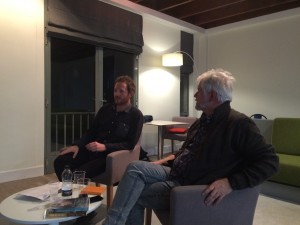Next up in the creative writing reading series was Nicholas Hogg, novelist, poet and short story writer. Nicholas was, as a poet, twice shortlisted for the Eric Gregory award, and later, as a novelist, His first novel, Show Me the Sky, was nominated for the 2010 International IMPAC Dublin Literary prize, and his second novel, The Hummingbird and the Bear, was published in 2011 and the recipient of a K Blundell Trust award. His third novel, Tokyo, is published by Cargo next summer., and this was his first public reading of its contents.
Nicholas didn’t always know he wanted to be a writer – it seems to be a myth that all writers do – indeed it seems we might have lost him to professional sports if not for a serious shoulder injury. He described his early adult years as itinerant – for example, to took a job on a ship aged 28 – accumulating experience that he now puts to use in his novels. And experience, personal experience, did seem to have particular importance, with Nicholas describing much of something akin to veiled memoir – with his experiences transposed onto different characters and plotlines to his own experience – the 14 year old runaway in Show me the Sky has experiences that are transposed scenes from Nicholas’s own experiences of hitchhiking. Though he assures us his life has been quite unlike the adulterous romance of The Hummingbird and the Bear, he moved to new York for 6 months in order to write the novel – walking in the city every day and building up a visceral connection with the place of the novel. Each day would impact on the story, allowing in the discoveries of exploring the city, and the story impacted on each day, sending Nicholas out to search for the locations of the scenes of his novel. Again, and as with Alex Preston and David Flusfeder, we were encouraged to practical research to fully understand the places and stories of our writing. Tokyo, though less autobiographical than his previous two books, comrs out of the two years Nicholas spent as a TEFL teacher in Japan, consciously earning the money that would then allow him some freedom to write. In fact, it was even more useful than that – Nicholas credits this teaching experience with sharpening what he believes to have been previously fairly lax use of language, vital in turning him into a writer. Worth remembering in the classroom.
Previous to Show me the Sky, Nicholas wrote a first – and he describes it as ‘baggy’ – novel that was never published. He urged budding writers not to become disheartened by initial failure, and to see the potential use of a ‘failed’ novel – saying that many pieces of Show me the Sky, including the passage he read to us about the motorcycle crash of a teenage runaway – were taken from the first novel. Sometimes, even years later, you can take pieces out of a ‘failed work’ and rework them into something successful.
He also advised, a similar technique if, unlike me, you’ve managed to be successful across disciplines – saying that he will sometimes use, not a line necessarily, but a piece, or few words, of poetry and transpose it onto the page of a novel in order to achieve a denseness, or concentration to set off the rest of the prose. He did, however, warn against overloading, repeating a piece of advice that Margaret Atwood once gave at Hay Festival and that has always stuck with him, that she restricts herself to a maximum of one simile per page.
Conversation, and reading, concentrated on Nicholas’s novels – Show me the Sky is a novel of people trying to escape their lives – the runaway, a rock star who fakes his own suicide (based on the Manic Street Preacher’s guitarist Richey Edwards’s presumed suicide, or disappearance) and the return journey of a young Fijian who has been subject to the British practice of kidnapping children, educating them in Britain and then sending them back as missionaries. Tokyo is, conversely, about people trying to find their life – the girl going out to Tokyo from California to meet her estranged father, her father’s pursuit of a Japanese ex-girlfriend, her pursuit by a man she has met on a plane, who identified her with the moon princess, Princess Kaguya. Even now when mount Fiji smokes, legend has it that the fumes are that of the everlasting life potion of the emperor, who threw away this gift from the princess when she returned to the moon, his will to live forever broken by the fact that that life would be without her. Drawing on Japanese folk legend, and acute and sympathetic observations of Japanese culture, this promises to be a beautiful book, and one to look out for come summer.

